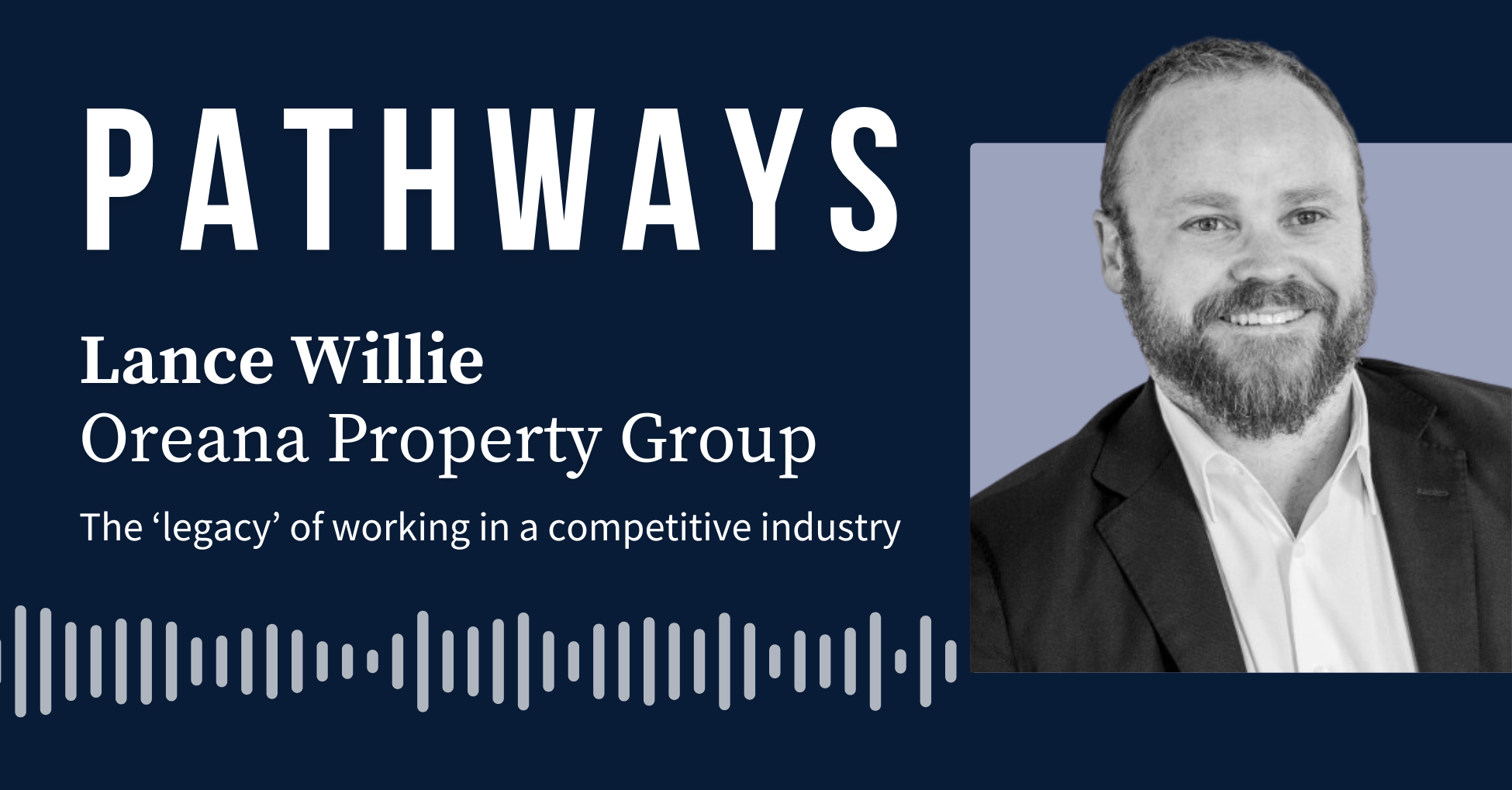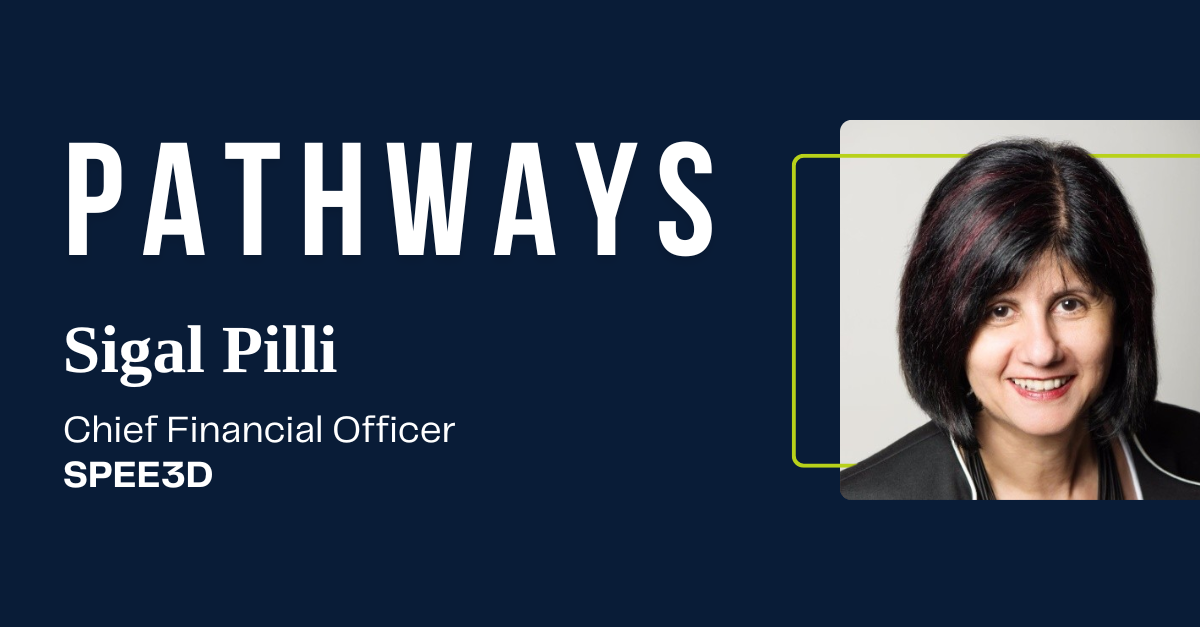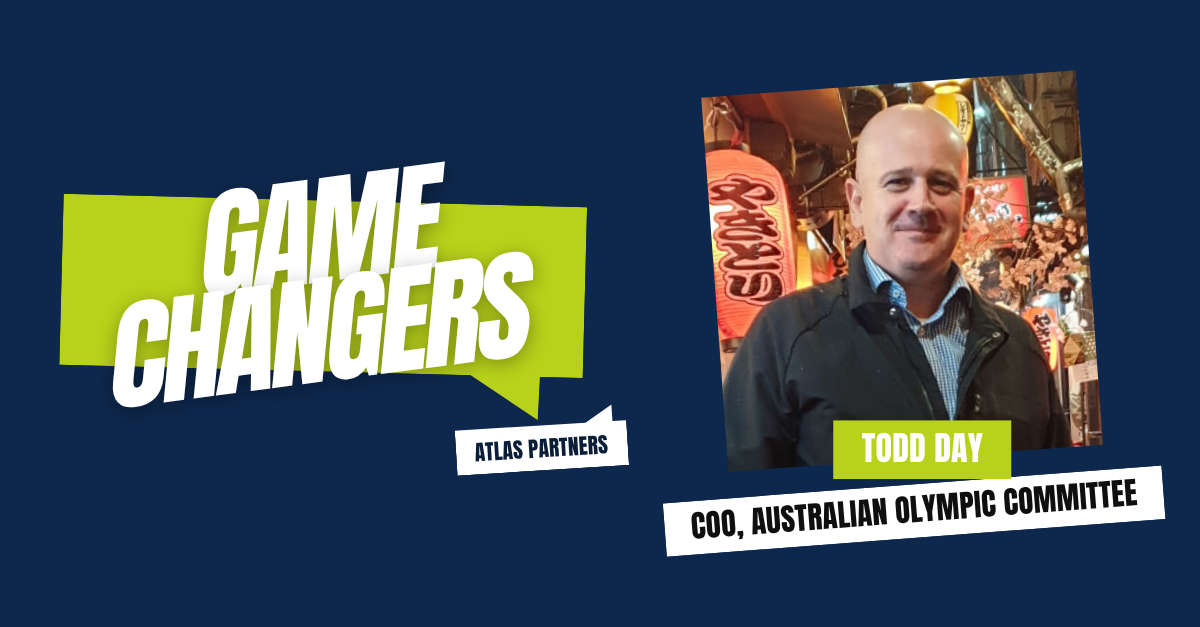Pathways — Lance Willie, Oreana Property Group
The ‘legacy’ of working in a competitive industry – Lance runs through what it means to not only navigate the competitive journey to CFO within Property, but how he develops his role and his team around him.
Craig Gorton, Director of Atlas Partners sits down with Lance to talk through his rise to CFO in one of the most competitive industries out there. Lance takes us through humble beginnings, into the leader he is today.
Craig Gorton: Let’s jump into this, Lance, I’d love to get a bit of information around your career to date, including the early days and what were your foundational learnings along the way? If you can run through a couple of those key learnings along your journey.
Lance Willie: My career’s probably not the traditional CFO career path, I didn’t go to a private school, I went to a public school in the inner West of Melbourne. Whilst going through VCE, I was working quite a bit at the time. This was the time where the economy was coming up through a recession. My parents weren’t working, so to a degree, I was studying and working quite a bit, just doing general retail management or labouring just to bring money in. With that in mind, I probably didn’t quite get the results I would have otherwise expected in VCE and it was really getting to the end of that year 12 period and trying to work out what I wanted to do and what I wanted to be.
But I always had an interest in finance and business, so graduating out of high school, I went to TAFE. I did an Advanced Certificate in Accounting which started with, I think, eight classes of twenty students. By the end of the first semester, it was down to two classes of twenty students. By the end of the year, we were down to about fifteen students out of close to a hundred-fifty students to start with. The theme was you either liked it or you hated it, there was nothing in between. I got fantastic marks, close to 100% on almost everything, I just got accounting and the business side and really loved it. I then took those credits into the university course and did a double in Accounting and Banking and Finance. Through that period, I got an opportunity to do a Co-op year or sandwich year, which would have been year three of the full university course, which for me was year four.
I ended up getting a placement at the Melton Shire Council and spent a year there and at the end of that year I was offered a full-time position to stay on and continue my studies part-time. I took that opportunity. It was great to earn some money and also learn some new skills. I was there about three and a half years. I learnt the fundamentals and realised local government was probably not the right place for me. But building the base there and having some accounting skills to then move into my next corporate role was a good thing. I then left there as I graduated my degree, I got a role in the head office with GSA Industries, which was a very large Australian corporate. It was a family office, so it was a very small accounting team. I had the group CFO and myself reporting directly into him.
A lot of the role was consolidating financials from their large operating businesses and running a family office. It was a lot of personal family tax and I had a breath of experience from secondments to other businesses and interests that the owners bought into. I got experience in the livestock industry because they loved and trained horses and created a business out of that. With that broad role I had to learn how telephony worked and at the time, Blackberry phones were the hot subjects and an item to have. I had to be the expert in all the technology outside of just being an accountant. Thinking through the foundations that I still use today, what I learned through those first couple of roles and in various industries, is you need to be inquisitive. And it’s important to question a lot of things, (and not just question people and processes because that’s very important to do), but I think it’s important to question the instructions you’re given for the tasks. Take that questioning and make sure what you’re going to come back with, whether it’s a report or a process, is what is wanted and required. Quite often you’ll be asked a question, you go away and you’re off on a tangent somewhere else and not what the business or your manager wants.
I found through those first couple of roles, was to question and clarify the instructions and the output. Questions like, is this what you want? Why do you want it? And how do you want it? Clarify that you’re both on the same page. It saves a lot of time, and you learn a lot through the process. A lot more thought about the process, understanding why you are doing the task. I was told in my earlier career, “you ask too many questions. Just go away and do it”. But by asking the questions, I was a lot more efficient, and I learnt a lot more because I understood the why. In my opinion, it is as important as the what or the how.
Craig Gorton: You now work in the property development industry, one of the most competitive I come across, I’d like to know what attracted you to the industry and was it what you expected.
Lance Willie: Great question and again probably non-traditional in my path. A lot of what I’ve done has been non-traditional. What attracted me to property? I’ve always loved property and probably most of the readers and listeners here would say property has got this sexy flair to it. It’s exciting, it’s ever moving. My journey into property was very random. I really fell into property. I was looking for a permanent role. I was sitting in a CPA Australia Executive Committee meeting and I received a random call saying, hey, there’s this role. Do you want it? It’s temp role, and It’s in property. My first response was, I am looking for a permanent role. But, I’ll accept with the view that hopefully it will move into a permanent role. At the end of the first week, the role was offered to me in a permanent sense.
It was a new senior role within this organisation as Financial Controller. Previously they had been moving along with a really good General Manager of Accounting, but he was more operational than tax and accounting. They needed someone to come in with the technical skills to take the business to the next level. If I had my time again, I probably would have been a little bit more strategic with picking out property. It’s a great industry, there’s so much to learn and do. There’s a lot of repetitiveness with doing apartments, high-rise apartments or townhouses or even commercial assets like office buildings. They’re all the same, but they’re all very different. Every project has its unique differences and difficulties. There’s a challenge with everything, so you have to know your stuff and always come back to the basics and foundations that you’ve learned and work through solutions on each project.
Craig Gorton: Having been in the property industry for a number of years, what is your view on the future of a CFO in property development. What would you say the future looks like?
Lance Willie: Speak to anyone that’s worked in property for more than 10 years (and I’m coming up to 20 years), most of them think that it’s getting all too hard and they’d rather not work in property, but it’s addictive. We’re going to need property for a very long time and it really is how well balanced and well-built a business is to roll with the challenges. There’s always a challenge and at present we’ve seen the property industry go through one of the hardest times with price increases for materials and labour, cost escalations are at never before seen levels.
Interest rates of recent times, that was unexpected. We’re just in a perfect storm at the moment where the market is going through it an ever state of flux. The second-hand market in housing in growth areas is still at a low enough level where new stock can’t compete with it, and we need that cycle to run through. Builders going broke has been a bit of a problem in the industry, in the last two years which has put a lot of pressure on the market and it’s knocked the confidence from those that want to commit to new property. It’s a slow market at the moment. Those businesses, like ours, are well placed and well-resourced to ride these slower times and we have different products and different developments, with our bread and butter being housing. We will ride through this next cycle and be very well placed to take opportunities and start projects that otherwise are on hold.
The future of property will always need property. For any young accountant aspiring to be a CFO working in property or wanting to work in property, it really is a case of being on top of your compliance, understanding the business metrics and the operational side of the business. You wouldn’t find a developer out there that doesn’t focus solely on their cash flow. What is more important, is my cash flow profitability and project feasibilities, but cash, cash is king, and all developers are very focused on when is the cash going out and when is the cash coming in. You need to confidently be on top of cash flows, reporting and your compliance, then you’re fine. When you lose track of those, is where it gets a bit hairy.
I think that the last thing to say to anyone thinking about property , it’s hard work. It is a lot of hard work. You’re dealing with so many different metrics and people within the organisation that have varying skills from, the operational development side, to the builders, to compliance. Every day you’re getting involved in various aspects of the business that is creating something substantial and emotional, such as , someone’s home or small businesses first office,. People get emotional about what we’re producing and that’s quite exciting to get to the end of the project and see that you’re creating something of substance.
Craig Gorton: Moving through to mentors, I’d be really interested to see if there’s been any mentors or anyone who’s had a strong impact on your career up until this day.
Lance Willie: I’ve put a bit of thought around this one and I struggle to come up with any particular one mentor. There’s definitely not been any formal mentorship. One of the fundamentals or aspects of being a CFO or a group CFO, or even for that matter, a finance manager or finance controller, is that the closer you get to the most senior finance role within an organisation (and it depends on the size and scale of that organisation), it gets a bit lonely within the business.
I would probably say from my third professional role, I’ve been the most qualified and most senior finance person within the organisation, bar one. And that was my first foray into property at Hallmarc, where the general manager was an auditor from a prior life. He understood the compliance side, but he wasn’t technically strong in tax and current in accounting. He was the closest I had to an early mentor at the time, and he would guide me so, I haven’t had too many mentors that I would either go to or could get some help from or guidance. But what I will say is I have built and focused on building and maintaining good relationships with my peers, other CFOs or financial controllers, including consultants in various areas. So for me in property, I have consultants that have property experience, bankers, and tax partners, or audit partners. These are people I’ve known for 15-20 years, where I can ring and bounce an idea off or challenge a topic with. That’s probably how I use the mentoring side, where I have a panel of mentors or people I can go to and share ideas with or bounce an idea and really just confirm ‘Am I on the right path?’
Again, non-traditional, but everything with me seems to be a bit non-traditional. On the other hand, I have mentored a lot of young and mid-level finance professionals, and for that matter, property development managers and even finance people that are not in property development. They will quite often, in a bit more formal sense, seek me out to mentor them. I get a lot out of that. The mentor-mentee relationship is a two-way street. I get a lot out of mentoring others and quite often that’s probably a bit of reverse mentoring, I get back what I put in. As we’re working through their thoughts and challenges, it involves some of my own, and I develop and evolve through that process as well. But circling back from formal mentorship, I think a lot of people take that as meaning you need a formal mentor, and it needs to be that way. I think that’s important, but don’t downgrade the value you get out of your own network. Because in an indirect sense, they are mentoring you, and that can be technical/ non-technical matters, it could be operational; it could just be psychological and how you balance out your thoughts and how to deal with a challenging meeting or discussion.
Craig Gorton: And finally, Lance, again, this is going to give us a bit of an insight into you on a personal level, I’d love to know what your favourite book is and why.
Lance Willie: A book that comes to mind that I’ve read more than once and I love the concepts within the book, and it brings together three things I’m passionate about: life, sport, and business. It’s called “Legacy” by James Kerr, and as you go through the book, you can compare it to anything within your life, your business being career or work, and sport. The book is about the ‘All Blacks’, the national rugby union team of New Zealand. A lot of people today wouldn’t remember, but the ‘All Blacks’ were a terrible team. They were average; they had a culture problem. What needed to change was very much that culture and how they were going about bringing the right players through the system and what that system meant. How do you become the best? It would be almost the best sporting team in the world; they’ve now had so much success. And they’ve been at the top for a long time now. As a long-suffering Australian rugby fan, I know!
A lot of the concept was, what does it mean to wear the jersey, the ‘All Blacks’ jersey? And they had to create this, and that’s why it’s called “Legacy.” The legacy of the jersey. The minute you put that on, you are at a new standard, a particular standard, and there are no exceptions. You are either in the right culture, the right attitude for that jersey, or you don’t wear the jersey. They made the jersey being this ultimate meaning, and through that process of changing management, leadership style, you’ve got to have a meaning. That’s how they turned their performance around to be one of the most successful sporting teams, going right through from then and now, it’s right out there in the same way as running a business. I’ll talk about a business or a person or a sporting club, you have to create a sense of connection, your staff or your team or players, for that matter, even admin management, coaches, you’ve got a sense of connection, collaboration, and communion. You’ve got to really break down all of the barriers, and everyone needs to truly believe in the strategy and in the business and where you’re going.





